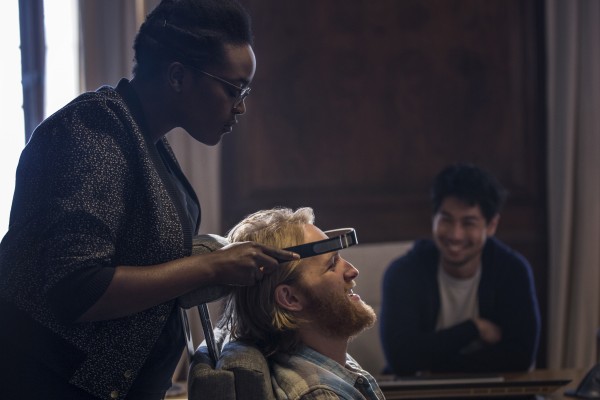As its writers grow in experience, Black Mirror has evolved as a show, and Season 3 presents another forward step in this regard – veering between brilliance and unfulfilling while for the most part residing in the former category.
Starting things off strongly, ‘Nosedive’ will be very familiar to those who have seen the ‘MeowMeowBeenz’ episode of Community, although it stands out by virtue of the sheer ingenuity of the writing and the horrific possibilities it presents. Depicting a world in which users rate each and every interaction – and those with low ratings are treated as pariahs – on a superficial level it critiques the importance certain people place on social media interactions and the unhealthiness of perennially living with one eye on our phones. Dig a bit deeper and it’s something else entirely, with Bryce Dallas Howard delivering a career-best performances as the protagonist, whose obsession with public-eye perfection takes a fittingly chaotic turn.
The first episode to acknowledge Brooker’s videogame roots, ‘Playtest’ is similarly impressive, even if it can’t quite match the depth of the first episode and ultimately has less to say. Wyatt Russell is brilliantly hapless in the lead role, transforming from a wry, wise-cracking everyman into a bundle of shattered nerves throughout the episode’s course. Permanently gripping, it will keep you guessing right up until the Terry Gilliam-evoking ending.
Undoubtedly the high point of Season 3, however, is ‘Shut Up And Dance’. Alex Lawther is a revelation as young Kenny, who is blackmailed by an unseen assailant to commit a number of seemingly random yet dangerous tasks, accompanied by the similarly entrapped Hector (Jerome Flynn). We really don’t want to say too much about this episode in case you haven’t seen it, but needless to say it’s up there with the best episodes that Black Mirror has ever produced. Spellbinding and shocking, and the beneficiary of a final act gut-punch to rival that of Season 2’s ‘White Bear’, you’ll be thinking of this one long after its over.
‘San Junipero’ represents a big-budget change of tone, depositing us in a world where people can choose to be downloaded into a Cloud-esque sever upon their deaths, where they can live their lives in the titular cyber-city, unable to come to harm and free to do whatever they fancy. At the centre of it all is an affecting love story between the free-spirited Kelly (Gugu Mbatha-Raw) and the more secretive and reserved Yorkie (Mackenzie Davis), whose performances are ultimately the main reason to keep watching. Coming across as The Matrix by way of Days Of Heaven, it’s utterly beautiful, but it shows its hand way too early, blunting the impact of the final third as a consequence.
‘Men Against Fire’ is similarly high-end in its ambition, pitching its leads into a war as frontline soldiers, tasked with eliminating dangerous mutated humans known as roaches – although in Black Mirror tradition, things are far from this simple. Arguably the weakest instalment of the approach, its themes (which again, we can’t really give away here) are delivered with a heavy hand and a lack of subtlety, ultimately exuding the ‘no-shit Sherlock’ anathema that characterised elements of Season 1. It’s not bad exactly (again, the performances are top-notch), but it’s not really saying anything new.
Perhaps the most relevant episode of the series, ‘Hated In The Nation’ uses its Scandi-detective-thriller sheen as a disguise for its interrogation of 21st century online staples like Twitter hate campaigns and demands for instant justice, with Kelly MacDonald its world-weary 21st Century Philip Marlowe. Despite the above description, it’s somehow the most straightforward episode of the series, taking the murder-mystery format and giving it a bend, if not an outright twist. Black Mirror hasn’t ever exactly been glowing in its portrayal of humanity, and this represents perhaps its most damning indictment yet. Sadly, future technology aside, it doesn’t even come across as far-fetched anymore.
Bleak it may be, but Season 3 is the one in which Black Mirror really comes of age, slipping its tendrils into the public consciousness for good. Event TV as its finest, it has legitimately started to justify those Twilight Zone comparisons.
